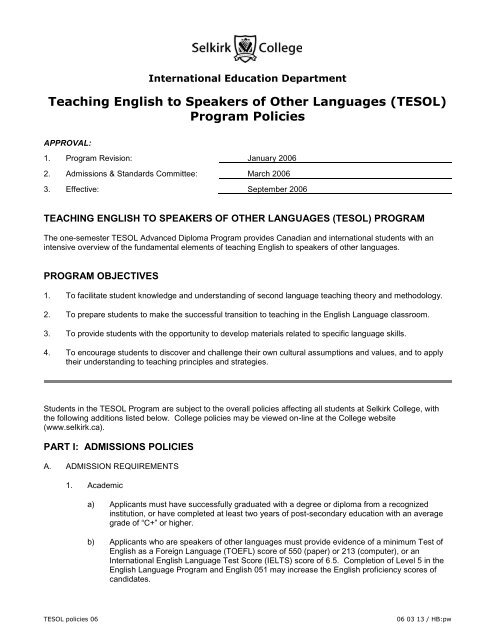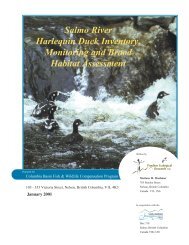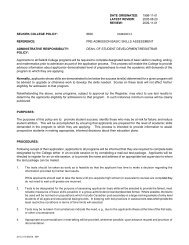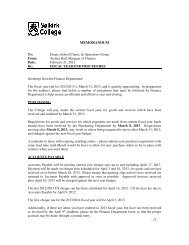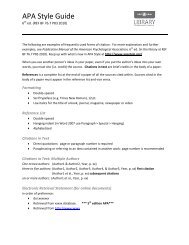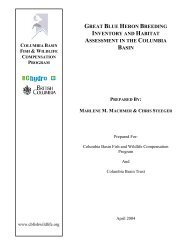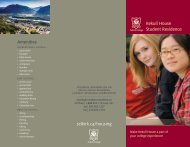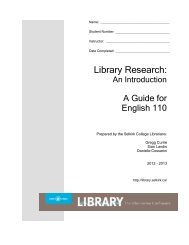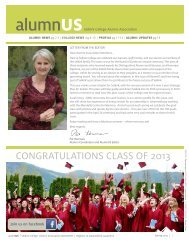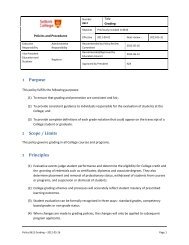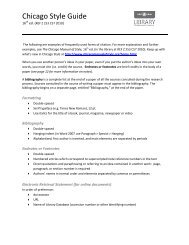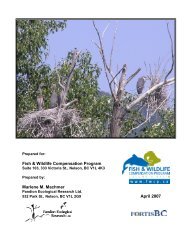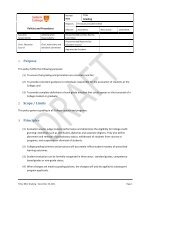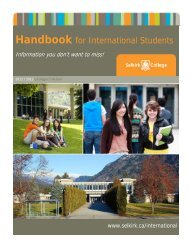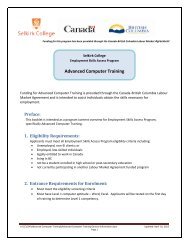Teaching English to Speakers of Other Languages (TESOL ... - Policy
Teaching English to Speakers of Other Languages (TESOL ... - Policy
Teaching English to Speakers of Other Languages (TESOL ... - Policy
Create successful ePaper yourself
Turn your PDF publications into a flip-book with our unique Google optimized e-Paper software.
International Education Department<strong>Teaching</strong> <strong>English</strong> <strong>to</strong> <strong>Speakers</strong> <strong>of</strong> <strong>Other</strong> <strong>Languages</strong> (<strong>TESOL</strong>)Program PoliciesAPPROVAL:1. Program Revision: January 20062. Admissions & Standards Committee: March 20063. Effective: September 2006TEACHING ENGLISH TO SPEAKERS OF OTHER LANGUAGES (<strong>TESOL</strong>) PROGRAMThe one-semester <strong>TESOL</strong> Advanced Diploma Program provides Canadian and international students with anintensive overview <strong>of</strong> the fundamental elements <strong>of</strong> teaching <strong>English</strong> <strong>to</strong> speakers <strong>of</strong> other languages.PROGRAM OBJECTIVES1. To facilitate student knowledge and understanding <strong>of</strong> second language teaching theory and methodology.2. To prepare students <strong>to</strong> make the successful transition <strong>to</strong> teaching in the <strong>English</strong> Language classroom.3. To provide students with the opportunity <strong>to</strong> develop materials related <strong>to</strong> specific language skills.4. To encourage students <strong>to</strong> discover and challenge their own cultural assumptions and values, and <strong>to</strong> applytheir understanding <strong>to</strong> teaching principles and strategies.Students in the <strong>TESOL</strong> Program are subject <strong>to</strong> the overall policies affecting all students at Selkirk College, withthe following additions listed below. College policies may be viewed on-line at the College website(www.selkirk.ca).PART I: ADMISSIONS POLICIESA. ADMISSION REQUIREMENTS1. Academica) Applicants must have successfully graduated with a degree or diploma from a recognizedinstitution, or have completed at least two years <strong>of</strong> post-secondary education with an averagegrade <strong>of</strong> “C+” or higher.b) Applicants who are speakers <strong>of</strong> other languages must provide evidence <strong>of</strong> a minimum Test <strong>of</strong><strong>English</strong> as a Foreign Language (TOEFL) score <strong>of</strong> 550 (paper) or 213 (computer), or anInternational <strong>English</strong> Language Test Score (IELTS) score <strong>of</strong> 6.5. Completion <strong>of</strong> Level 5 in the<strong>English</strong> Language Program and <strong>English</strong> 051 may increase the <strong>English</strong> pr<strong>of</strong>iciency scores <strong>of</strong>candidates.<strong>TESOL</strong> policies 0606 03 13 / HB:pw
TEACHING ENGLISH TO SPEAKERS OF OTHER LANGUAGES (<strong>TESOL</strong>) Program Policies Page 22. Generala) Prior work or volunteer educational experience, preferably with second language learners,and/or coursework in education is desirable.b) Applicants are required <strong>to</strong> attend an interview and submit a current resume. Wherecircumstances make a personal interview impractical, a telephone interview will be conducted.Interview results are not used as criteria for admissions.3. Mature StudentsB. SELECTIONa) A “mature student” is at least 19 years and has been out <strong>of</strong> the school system for at least oneyear on or before the first day <strong>of</strong> classes <strong>of</strong> the program.b) A mature student, with reasonable potential for success on the basis <strong>of</strong> work experience orother criteria may be admitted, notwithstanding some deficiency in prior formal education.c) A mature student shall normally meet the specific program or course prerequisites.Applicants will be separated in<strong>to</strong> two levels as identified in Selkirk College <strong>Policy</strong> B3002.1 (Admissions andStandards), namely, “fully qualified” and “partially qualified”.1. Fully QualifiedThe applicant meets all <strong>of</strong> the requirements stated in Part I, A. above.2. Partially QualifiedThe applicant is deficient in meeting some or all <strong>of</strong> the admission requirements stated in Part I, A,above.3. Order <strong>of</strong> SelectionSelection and acceptance <strong>of</strong> applicants will proceed in the following order:a) Within the fully-qualified level, preference shall be given <strong>to</strong> those with earlier completedapplications.b) Within the partially-qualified level, preference shall be given <strong>to</strong> those considered best qualified.C. APPLICATION PROCEDURES1. Before an applicant’s file is completed, the following must be received:a) All post-secondary transcriptsb) <strong>English</strong> pr<strong>of</strong>iciency test scores (Refer <strong>to</strong> Part 1, A.1, b, above)c) Current resumé2. Initial applications <strong>to</strong> Registration/Admissions should be submitted by June 30 th . Late applicants willbe accepted subject <strong>to</strong> space availability.<strong>TESOL</strong> policies 0606 03 13 / HB:pw
TEACHING ENGLISH TO SPEAKERS OF OTHER LANGUAGES (<strong>TESOL</strong>) Program Policies Page 33. The deadline for receiving required documentation is normally July 31 st .4. Interviews will normally be arranged by a program designate when the applicant=s file is complete.Interview results are not used as criteria for admission.D. RE-ENTRY1. Students in good standing, who must interrupt their program, may apply <strong>to</strong> re-enter within one year <strong>of</strong>departure.2. Normally, students who re-enter in one year or less will maintain full credit for all courses previouslycompleted. After more than one year’s absence, students may be required <strong>to</strong> update or repeatcourses already completed.3. Re-admission is dependent upon sufficient places being available in the semester for which re-entryis being sought.4. Exceptional cases will be considered individually, at the discretion <strong>of</strong> the Department Head <strong>of</strong>International Education.PART II: PROMOTION POLICIESA. EVALUATION1. Gradinga) Grading will be based on the categories defined in Selkirk College <strong>Policy</strong> B3002.1 (Admissionsand Standards), Part II, Section 4.0 and 8.0.2. Frequency <strong>of</strong> Evaluationa) Students will complete assignments (as indicated in Part II, A .3) according <strong>to</strong> the frequencystated in each course outline.3. Types <strong>of</strong> Evaluationsa) Students are evaluated and graded in each subject or course <strong>to</strong>pic as indicated in therespective course outline. Evaluative events will include exams, assignments, group projects,and presentations.b) Exams, labs, projects, assignments and other evaluative activities are weighted and averagedas indicated in the respective course outline.4. Examination <strong>Policy</strong>a) Assignments and exams must be written and submitted at the scheduled time. Exceptions willonly be considered when the instruc<strong>to</strong>r has been supplied with satisfac<strong>to</strong>ry evidence <strong>of</strong>personal illness, disability, extenuating circumstances or prior arrangements have been madewith the instruc<strong>to</strong>r.<strong>TESOL</strong> policies 0606 03 13 / HB:pw
TEACHING ENGLISH TO SPEAKERS OF OTHER LANGUAGES (<strong>TESOL</strong>) Program Policies Page 45. Plagiarism and Cheating(Excerpts below taken from Selkirk College Admissions and Standards <strong>Policy</strong> (B3002.1)B. PROBATION15.1 Honesty is expected and required <strong>of</strong> all students. The purpose <strong>of</strong> this section <strong>of</strong> the policy is<strong>to</strong> deal with honesty in the conduct <strong>of</strong> all examinations, essays, reports and other assignmentsprepared or completed by students pursuant <strong>to</strong> the requirements <strong>of</strong> a Selkirk College programor course.15.2 Cheating is defined as dishonest or deceptive conduct or attempted conduct by whichindividuals or groups <strong>of</strong> individuals use or attempt <strong>to</strong> use unauthorized aids, assistance,materials and methods <strong>to</strong> represent their academic work, training and standards as their own.15.3 Plagiarism is defined as the presentation or submission <strong>of</strong> work or data (published orunpublished in any form), done in whole or in part by other persons, without citation or credit,as the student’s own work i.e., a group project, book journal, electronic media, etc.15.4 The submission <strong>of</strong> one’s own work for credit in more than one course without the expressknowledge <strong>of</strong> the instruc<strong>to</strong>rs involved is forbidden.15.5 Selkirk College will not condone nor will it accept work submitted <strong>to</strong> obtain credit which wasproduced through cheating or plagiarism.1. Purposea) For a first <strong>of</strong>fence the assignment, test, exam, paper project or other work involved willbe awarded a grade <strong>of</strong> zero <strong>to</strong> be incorporated in<strong>to</strong> the calculation <strong>of</strong> the final grade.b) For a second <strong>of</strong>fence, the student will be required <strong>to</strong> withdraw from the course.c) For any further <strong>of</strong>fence, the student will be required <strong>to</strong> withdraw from the college.d) A record <strong>of</strong> the foregoing will be kept in the student’s <strong>of</strong>ficial record.e) Depending on the nature <strong>of</strong> the <strong>of</strong>fence, steps (a) and/or (b) above may be by-passed,following consultation or instruc<strong>to</strong>r, School Chair, and/or Registrar.a) Probation is intended <strong>to</strong> provide a formal mechanism <strong>to</strong> assist students with unsatisfac<strong>to</strong>ry ormarginal performance or <strong>to</strong> improve their performance.2. Criteria for placement on academic probationa) Student may be placed on academic probation only during the first two-thirds <strong>of</strong> a program termor semester, under the following circumstances:(i)Failure <strong>to</strong> meet course requirements at a satisfac<strong>to</strong>ry level in formative (interim)appraisals.3. Criteria for placement on behavioural probationa) A student may be placed on behavioural probation at any time during the term or semesterunder the following circumstances:(i)A level <strong>of</strong> absenteeism from learning experiences which results in the student beingunprepared for learning or compromising the learning <strong>of</strong> others.<strong>TESOL</strong> policies 0606 03 13 / HB:pw
TEACHING ENGLISH TO SPEAKERS OF OTHER LANGUAGES (<strong>TESOL</strong>) Program Policies Page 5(ii) Performance which compromises the safety <strong>of</strong> others (as cited in College <strong>Policy</strong> 3002.1,article 10.3).(iii) <strong>Other</strong> behaviour as referred <strong>to</strong> in the Student Code <strong>of</strong> Conduct <strong>Policy</strong> B3002.4. While on probation, a student will consult a Department advisor <strong>to</strong> determine areas <strong>of</strong> difficulty andplan a program <strong>of</strong> remedial action. At the end <strong>of</strong> the probationary period, student progress will be reassessed.5. Criteria for removal from probationa) Conditions for removal from probation will be specified in the written notification <strong>of</strong> probation.6. Failure <strong>to</strong> meet conditions <strong>of</strong> probationa) Students who fail <strong>to</strong> meet the specified conditions or stipulated standards, as outlined in theirprobation letter, will be required <strong>to</strong> withdraw from the course and/or the program.7. Number <strong>of</strong> probationary periods alloweda) One probationary period is allowed.C. EXCLUSION OR DISMISSAL (See Selkirk College <strong>Policy</strong> B3002.1, Part II, Section 16.0.)1. An instruc<strong>to</strong>r may exclude a student from participating in a class, if the student would not receivesufficient educational benefit from the experience due <strong>to</strong> lateness, prior absence, inadequatepreparation, or if he/she disrupts the learning <strong>of</strong> others.2. An instruc<strong>to</strong>r may recommend <strong>to</strong> the Department Head that a student be completely excluded from acourse if that student has missed instructional times or failed <strong>to</strong> complete the assigned work <strong>to</strong> such adegree that he/she could not compensate sufficiently <strong>to</strong> pass the course in the time available, or if thestudent has compromised the safety <strong>of</strong> others, has been destructive <strong>to</strong> property, or if the student hasdisrupted the learning opportunities <strong>of</strong> others.3. A student recommended for exclusion from a course/program will receive notification from and will beexcluded by the Registrar on the recommendation <strong>of</strong> the Department Head.D. APPEAL (See College <strong>Policy</strong> B3007.)1. A student dissatisfied with a final grade or program decision (e.g., probation, exclusion, dismissal)may appeal the College's action by following this sequence:a) Contact the course instruc<strong>to</strong>r in writing.b) Contact the Department Head in writing.c) Contact the Dean in writing.NOTE:A student ombudsperson may be available <strong>to</strong> assist the student in this process. If theissue has not been resolved, the student may then choose <strong>to</strong>:d) Appeal <strong>to</strong> the Student Appeals Committee by contacting the College Registrar.e) Students have five working days from the time they are notified <strong>of</strong> their final grades <strong>to</strong> appeal agrade.<strong>TESOL</strong> policies 0606 03 13 / HB:pw
TEACHING ENGLISH TO SPEAKERS OF OTHER LANGUAGES (<strong>TESOL</strong>) Program Policies Page 6E. ATTENDANCEf) From the time <strong>of</strong> <strong>of</strong>ficial notification students have five working days <strong>to</strong> appeal probationarystatus, exclusion or dismissal.1. Students are expected <strong>to</strong> attend all classes and <strong>to</strong> demonstrate punctuality. Poor performance inthese areas may result in the student being put on probation.Note: Attendance and punctuality are considered important elements <strong>of</strong> pr<strong>of</strong>essionalism. Studentteachers are expected <strong>to</strong> demonstrate pr<strong>of</strong>essionalism as they make the transition in<strong>to</strong> the workplace.2. Students absent from any learning activity for any reason are responsible for making up the work theyhave missed. The program cannot undertake <strong>to</strong> provide substitute learning experiences in courseswhen students have been absent.3. Absence from learning activities could prevent the student from being able <strong>to</strong> meet the requiredobjectives <strong>of</strong> the course.4. Students absent for illness or compassionate reasons must contact the instruc<strong>to</strong>r prior <strong>to</strong> the class, inperson, by phone or in writing. Students may be required <strong>to</strong> provide a letter from a doc<strong>to</strong>r <strong>to</strong> verifyclaims <strong>of</strong> illness longer than two days.F. ASSIGNMENTS AND EXAMINATIONS1. Assignments must be handed in on the due date or the assignment mark may be penalised as statedon the course outline. Exceptions <strong>to</strong> due dates must be negotiated with the instruc<strong>to</strong>r involved 48hours in advance <strong>of</strong> the due date.2. Plagiarism refer <strong>to</strong> Part II A, 5.3. Examinations will be scheduled as described in course outlines.4. Students who must be absent from an examination due <strong>to</strong> special circumstances such as illness,accident or family emergency may apply for permission <strong>to</strong> rescheduled the examination. Studentswho do not apply for such permission and who fail <strong>to</strong> write a scheduled examination will receive amark <strong>of</strong> zero on the examination in question.5. Students guilty <strong>of</strong> dishonest practices during an examination shall be immediately dismissed from theexamination and will receive a grade <strong>of</strong> zero. Further action may be recommended by theDepartment <strong>of</strong> International Education if deemed appropriate.6. Examination pro<strong>to</strong>col includes but is not limited <strong>to</strong> the following:a) Eating will not be allowed in the examination room.b) Students are expected <strong>to</strong> conduct themselves as quietly as possible in consideration <strong>of</strong> others.c) Students are expected <strong>to</strong> be punctual.<strong>TESOL</strong> policies 0606 03 13 / HB:pw
TEACHING ENGLISH TO SPEAKERS OF OTHER LANGUAGES (<strong>TESOL</strong>) Program Policies Page 7G. CLASSROOM ENVIRONMENT1. The classroom is a learning environment. It should be comfortable and safe. Teachers and studentsshould seek <strong>to</strong> create an atmosphere that stimulates and promotes learning. To this end thefollowing policies apply:H. GRADUATIONa) The use <strong>of</strong> <strong>to</strong>bacco products is not permitted within college buildings.b) Food consumption is not allowed during classroom sessions.c) All classrooms are <strong>to</strong> be kept in a clean and well-ordered state.1. A <strong>TESOL</strong> Advanced Diploma will be awarded <strong>to</strong> the graduate at the end <strong>of</strong> the academic term.2. The requirements for graduation include the successful completion <strong>of</strong> the following courses with aminimum grade <strong>of</strong> “C” in each course.TSOL 102TSOL 104TSOL 106TSOL 108TSOL 110TSOL 112TSOL 114TSOL 116Second Language Acquisition and TheoryClassroom Practice and Organisation<strong>English</strong> Language Curriculum and materials DevelopmentLanguage and CulturePracticum Experience and SeminarGrammar and PhonologyTesting and EvaluationComputer Assisted Language Learning (CALL)06 03 13 / HB:pw<strong>TESOL</strong> policies 0606 03 13 / HB:pw


